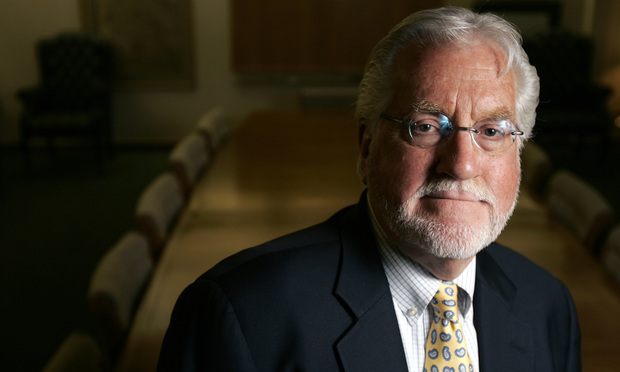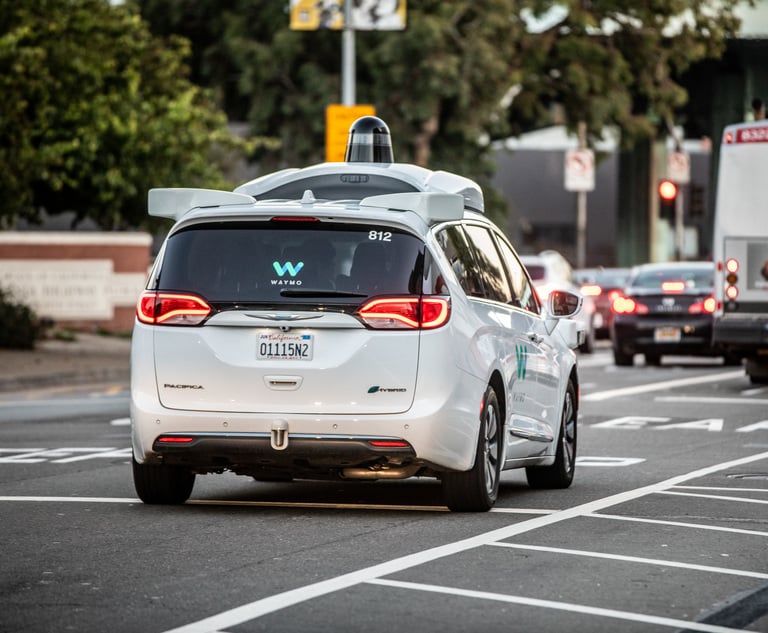Cotchett Takes on Apple in Patent Case Over 'Do Not Disturb' Feature
Joseph Cotchett, of Cotchett Pitre & McCarthy, argues that it is "inconceivable" that Apple did not know of the patent blocking incoming texts and calls while driving issued two years prior to the launch of the company's "Do Not Disturb" feature.
December 13, 2019 at 06:12 PM
3 minute read
 (Photo: Songquan Deng/Shutterstock.com)
(Photo: Songquan Deng/Shutterstock.com)
Prominent plaintiffs attorney Joseph Cotchett is representing a patent holder in a case against Apple Inc. over the "Do Not Disturb" feature on the company's mobile devices.
Cotchett's client in the case, San Francisco-based SMTM Technology, alleges Apple has infringed upon its "Off Mode" patent for an application blocking incoming texts, calls and notifications while driving. Inventor and Bay Area restaurateur Nick Bovis secured the patent in 2015 to help prevent distracted driving—two years before Apple rolled out its Do Not Disturb feature touting similar capabilities, according to the complaint filed Friday in the U.S. District Court for the Northern District of California.
"Given the massive legal resources available to Apple to search its new technology for patent infringement, and the knowledge that its software engineers and business executives have of the apps available for download on the Android platform, it is inconceivable that Apple was not fully aware of the Mr. Bovis' app and the Bovis Patent at the time it adopted 'Do Not Disturb,' " wrote Cotchett, of Cotchett Pitre & McCarthy in Burlingame, California, alongside senior associate Gina Stassi, as well as Paul Reidl of the Law Office of Paul W. Reidl in Half Moon Bay, California.
 Joseph Cotchett of Cotchett, Pitre & McCarthy LLP. (Courtesy photo)
Joseph Cotchett of Cotchett, Pitre & McCarthy LLP. (Courtesy photo)After learning about Apple's launch of Do Not Disturb, Bovis contends that he contacted the Cupertino, California-based company and requested royalties on the patent. "Apple responded by disclaiming any liability for anything, and ultimately dismissed Mr. Bovis as a 'patent troll,'" according to the complaint.
Not long after SMTM purchased the patent and contacted Apple, Unified Patents challenged the Bovis patent at the Patent Trial and Appeal Board, SMTM's lawyers assert. "When SMTM accused Apple of instigating the PTAB challenge to the Bovis Patent, Apple denied having anything to do with it. In Apple's view, it was simply coincidental that the Unified Patents challenge occurred after Mr. Bovis had contacted Apple and asked for a reasonable royalty," the attorneys wrote.
Unified Patents argued the technology was already known, but the PTAB ruled that it "failed to demonstrate a reasonable likelihood that it would prevail in showing the unpatentability of at least one challenged claim of the [Bovis Patent.]"
SMTM is asking the court to rule the Bovis Patent valid and enforceable, permanently enjoin Apple from infringing on the patent and award damages for SMTM's alleged injuries.
Neither Apple nor the plaintiffs lawyers responded to a request for comment at the time of publication.
This content has been archived. It is available through our partners, LexisNexis® and Bloomberg Law.
To view this content, please continue to their sites.
Not a Lexis Subscriber?
Subscribe Now
Not a Bloomberg Law Subscriber?
Subscribe Now
NOT FOR REPRINT
© 2025 ALM Global, LLC, All Rights Reserved. Request academic re-use from www.copyright.com. All other uses, submit a request to [email protected]. For more information visit Asset & Logo Licensing.
You Might Like
View All
Shareholder Democracy? The Chatter Musk’s Tesla Pay Case Is Spurring Between Lawyers and Clients
6 minute read
Willkie Farr & Gallagher Drives Legal Challenge for Uber Against State's Rideshare Laws
5 minute read

EPA grants California authority to ban sales of new gas cars by 2035. Action faces reversal by Trump
Law Firms Mentioned
Trending Stories
- 1Pogo Stick Maker Wants Financing Company to Pay $20M After Bailing Out Client
- 2Goldman Sachs Secures Dismissal of Celebrity Manager's Lawsuit Over Failed Deal
- 3Trump Moves to Withdraw Applications to Halt Now-Completed Sentencing
- 4Trump's RTO Mandate May Have Some Gov't Lawyers Polishing Their Resumes
- 5A Judge Is Raising Questions About Docket Rotation
Who Got The Work
J. Brugh Lower of Gibbons has entered an appearance for industrial equipment supplier Devco Corporation in a pending trademark infringement lawsuit. The suit, accusing the defendant of selling knock-off Graco products, was filed Dec. 18 in New Jersey District Court by Rivkin Radler on behalf of Graco Inc. and Graco Minnesota. The case, assigned to U.S. District Judge Zahid N. Quraishi, is 3:24-cv-11294, Graco Inc. et al v. Devco Corporation.
Who Got The Work
Rebecca Maller-Stein and Kent A. Yalowitz of Arnold & Porter Kaye Scholer have entered their appearances for Hanaco Venture Capital and its executives, Lior Prosor and David Frankel, in a pending securities lawsuit. The action, filed on Dec. 24 in New York Southern District Court by Zell, Aron & Co. on behalf of Goldeneye Advisors, accuses the defendants of negligently and fraudulently managing the plaintiff's $1 million investment. The case, assigned to U.S. District Judge Vernon S. Broderick, is 1:24-cv-09918, Goldeneye Advisors, LLC v. Hanaco Venture Capital, Ltd. et al.
Who Got The Work
Attorneys from A&O Shearman has stepped in as defense counsel for Toronto-Dominion Bank and other defendants in a pending securities class action. The suit, filed Dec. 11 in New York Southern District Court by Bleichmar Fonti & Auld, accuses the defendants of concealing the bank's 'pervasive' deficiencies in regards to its compliance with the Bank Secrecy Act and the quality of its anti-money laundering controls. The case, assigned to U.S. District Judge Arun Subramanian, is 1:24-cv-09445, Gonzalez v. The Toronto-Dominion Bank et al.
Who Got The Work
Crown Castle International, a Pennsylvania company providing shared communications infrastructure, has turned to Luke D. Wolf of Gordon Rees Scully Mansukhani to fend off a pending breach-of-contract lawsuit. The court action, filed Nov. 25 in Michigan Eastern District Court by Hooper Hathaway PC on behalf of The Town Residences LLC, accuses Crown Castle of failing to transfer approximately $30,000 in utility payments from T-Mobile in breach of a roof-top lease and assignment agreement. The case, assigned to U.S. District Judge Susan K. Declercq, is 2:24-cv-13131, The Town Residences LLC v. T-Mobile US, Inc. et al.
Who Got The Work
Wilfred P. Coronato and Daniel M. Schwartz of McCarter & English have stepped in as defense counsel to Electrolux Home Products Inc. in a pending product liability lawsuit. The court action, filed Nov. 26 in New York Eastern District Court by Poulos Lopiccolo PC and Nagel Rice LLP on behalf of David Stern, alleges that the defendant's refrigerators’ drawers and shelving repeatedly break and fall apart within months after purchase. The case, assigned to U.S. District Judge Joan M. Azrack, is 2:24-cv-08204, Stern v. Electrolux Home Products, Inc.
Featured Firms
Law Offices of Gary Martin Hays & Associates, P.C.
(470) 294-1674
Law Offices of Mark E. Salomone
(857) 444-6468
Smith & Hassler
(713) 739-1250






